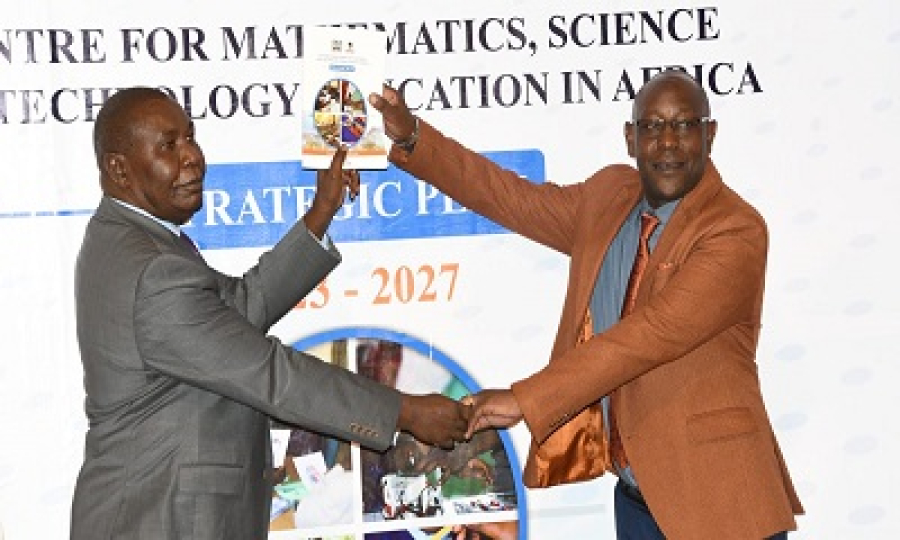CEMASTEA Strategic Plan 2023 – 2027: Key Highlights
The Strategic Plan is a Roadmap for Achieving the Centre’s Vision and Mission. It Outlines Strategic Objectives, Strategies, And Resource Requirements for the 2023-2027 Strategic Period. The Plan Will Enable CEMASTEA Focus Its Efforts, Allocate Resources, And Measure Progress Towards Desired Outcomes. Mandate: Develop Capacity in STEM Education, Training and Research. Vision: An Empowered, Creative and Innovative STEM Society In Africa And. Mission: To Continuously Develop Capacity In STEM Education For Sustainable Development Through Training, Research, Innovation And Partnerships With Related Ecosystems.
Strategic Goals: The following are the strategic goals for the Centre for the period 2023-2027Goal No. 1: Enhanced quality of teaching and learning
Goal No. 2: Increased evidence-based body of knowledge on STEM education
Goal No. 3: Realized stable resource base.
Goal No. 4: Increased partnerships, linkages and collaborations.
Goal No. 5: Enhanced governance and accountability.
Goal No. 6: Realized organizational effectiveness and efficiency.
Goal No. 7: Strengthened STEMI education, training and research in Africa.
Core Values: The aspirations of the Centre, as laid down in this Plan, will be anchored on the following core values: excellence, inclusivity, innovation, integrity, and sustainable impact.
Excellence: We strive for the highest standards of excellence, embracing a culture of continuous improvement and a commitment to quality in all its training, research and policy implementation programs.
Inclusivity: We promote inclusivity by creating an environment where all internal and external stakeholders feel valued, respected, and have a sense of belonging. The Centre will foster diversity, promote equal opportunities, embrace public participation and encourage divergent perspectives and inputs in running its programs.
Innovation: We foster a culture that encourages imagination, creativity, exploration of unconventional solutions, and pursuing ideas that challenge the status quo. The Centre will also promote the utilization of maker’s spaces and create platforms for showcasing ideas through STEM-based fairs and boot camps.
Integrity: We are dedicated to maintaining honesty, ethical conduct, and a steadfast commitment to doing what is right in all situations, whether in personal or professional pursuits. The Centre is committed to transparency and accountability, adhering to the highest standards and faithfully following the laws that govern its practices.
Sustainable Impact: We promote sustainable impact by making deliberate choices that contribute positively to the long-term well-being of our clients, society, the environment, and future generations. In the implementation of our programs, the Centre considers the economic, social, and environmental outcomes and aim to create sustainable benefits while minimizing the adverse effects.
23.6 Quality Policy Statement
The Centre for Mathematics, Science and Technology Education in Africa is committed to providing training to curriculum implementers and conducting educational research in a timely, efficient, and effective manner. The Centre is committed to satisfying customers, organizational, legal and ISO 9001:2015 requirements, and to the continual improvement of its quality management system.
| KRA | Strategic objective(s) | Strategies |
| KRA 1: Training and Competence Development | 1.1 To improve quality and relevance in all training programs | 1.1.1 Implementing needs-based training that addresses contemporary issues.1.1.2 Providing technical support for the implementation of the national STEM strategy and policy.1.1.3 Promoting creativity and innovation in STEM education.1.1.4 Promoting Education for Sustainable Development (ESD), particularly climate change actions. 1.1.5 Strengthening school-based teacher support programs. |
| 1.2: To enhance access, equity, gender parity and inclusivity in all training programs | 1.2.1 Increasing training opportunities for all curriculum implementers1.2.2 Promoting gender responsive pedagogy.1.2.3 Promoting equity, gender parity and inclusivity in STEM training for teachers1.2.4 Transform selected SNE schools to model STEM education | |
| 1.3: To increase e-learning utilization and ICT integration in STEM education. | 1.3.1 Promoting e-learning and ICT integration among the curriculum implementers of STEM education.1.3.2 Strengthening the e-learning platforms. | |
| KRA 2: Research, Development and Knowledge Management | 2.1: To enhance evidence-based STEM education. | 2.1.1 Strengthening research capacity in STEM education.2.1.2 Strengthening the quality of STEM education. |
| 2.2: To enhance knowledge management base. | 2.2.1 Strengthening research knowledge process management hub/repository | |
| KRA 3: Resource mobilization, partnerships and linkages | 3.1: To increase center’s resource base. | 3.1.1 Building resource mobilization capacity3.1.2 Enhancing business development function3.1.3 Enhancing resources from government’s allocations for strategic interventions. |
| 3.2 To enhance partnerships and linkages for improved competencies in STEM education. | 3.2.1 Expanding partnerships’ base for strategic interventions.3.2.2 Establishing strong linkages 3.2.3 Strengthening consultancy services portfolio | |
| KRA 4: Governance | 4.1: To improve corporate governance | 4.1.1 Strengthening the capacity of the board of governors4.1.2 Building capacity at the county committee levels.4.1.3 Strengthening organizational performance & productivity4.1.4 Implementing the Mwongozo code of governance for State Corporations and circulars issued by government. |
| 4.2: To enhance fiduciary assurance | 4.2.1 Enhancing the asset management4.2.2 Improving financial planning, budgeting and utilization.4.2.3 Strengthening the procurement process.4.2.4 Enhancing Risk-Based Audit (RBA). | |
| 4.3: To enhance environmental conservation. | 4.3.1 Increasing Forest cover under the national tree growing and restoration campaign.4.3.2 Enhancing e-waste management. | |
| KRA 5: Organizational strengthening | 5.1: To improve organizational visibility and strengthening effectiveness. | 5.1.1: Ensuring compliance to quality management system (QMS)5.1.2: Strengthening the Centre's corporate brand and visibility.5.1.3: Strengthening human capital 5.1.4: Improving infrastructural development and maintenance |
| 5.2: To increase the number of people accessing open resources. | 5.2.1: Enhancing digitization of documents and records5.2.2: Enhancing access and adaptation of teaching and learning resources | |
| 5.3: To enhance automation in key processes. | 5.3.1: Automating key processes5.3.2: Ensuring business continuity5.3.3: Enhancing safety and security of data & information | |
| KRA 6: Enhancing Science, Technology, Engineering, Mathematics and Innovations (STEMI) education. | 6.1 Strengthen CEMASTEA’s coordination role in promoting strategic interventions in STEMI education. | 6.1.1 Strengthening country chapters in member countries.6.1.2 Strengthening the continental secretariat functions.6.1.3 Enhancing CEMASTEA’s capacity to serve as an African Centre of excellence in STEMI education. |
| 6.2 To improve the policy environment that promotes STEMI education. | 6.2.1 Reviewing the policy framework for STEMI education and training environment6.2.2 Integrating diversity and inclusion into STEMI education and training in teacher professional development.6.2.3 Monitoring of policy environment and training programs continuously. | |
| 6.3 To improve STEMI education and training practices. | 6.3.1: Initiating African STEM curriculum reforms for greater relevance and flexibility.6.3.2: Initiating joint Africa teacher training and development programs.6.3.3 Integrating technology to Africa STEM training practices and pedagogy.6.3.4 Leveraging technology to scale STEM learning | |
| 6.4 To enhance STEMI research and development and knowledge management. | 6.4.1 Improving R&D in Africa STEMI domain to inform STEM policy, practice and research.6.4.2 Promoting knowledge sharing on innovative STEM practices | |
| 6.5 To strengthen collaboration and partnerships in STEMI education providers, industry leaders and policy makers. | 6.5.1 Promoting STEMI awareness and advocacy in Africa6.5.2 Enhancing global collaborations and partnerships in STEMI policy, research and practice |
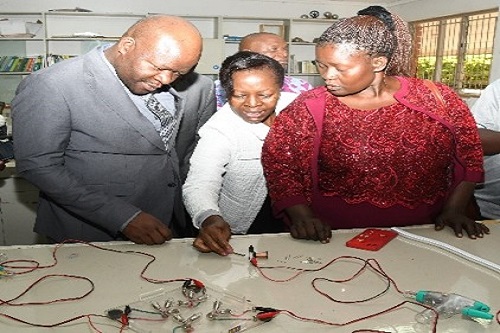
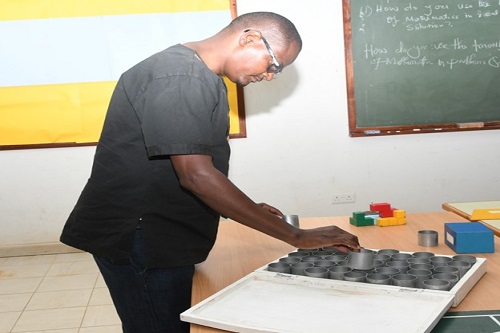
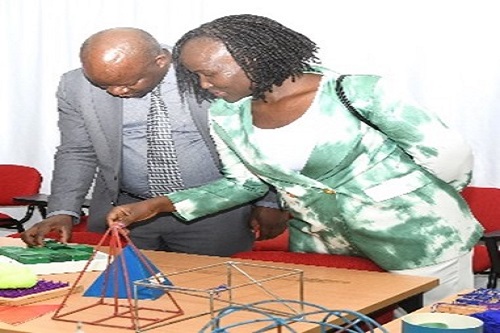
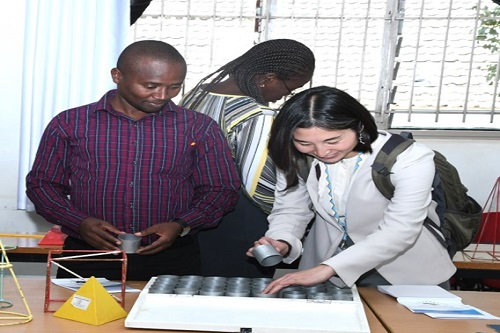
Guests interacting with the innovations at CEMASTEA during the launch of the Strategic Plan
Latest from Esther Nyambura
- CEMASTEA Hosts Successful INSET Centre Principals’ Workshop
- CEMASTEA Conducts Successful Holistic Learning Training for Rwandan Teachers
- Empowering Quality Standards and Assurance Officers (QASOs) for Enhanced STEM Education
- Science and Mathematics Teachers Pilot Symposium: Innovative Classroom Practices
- GLOBAL PARTNERSHIPS: CEMASTEA and JICA Redefining Teacher Training

